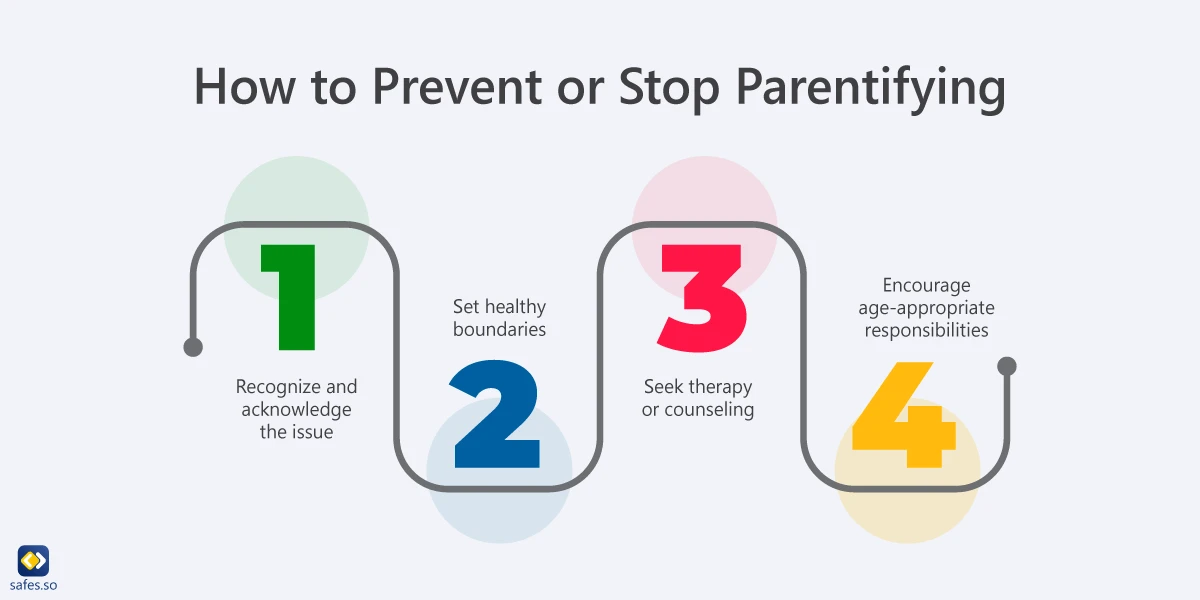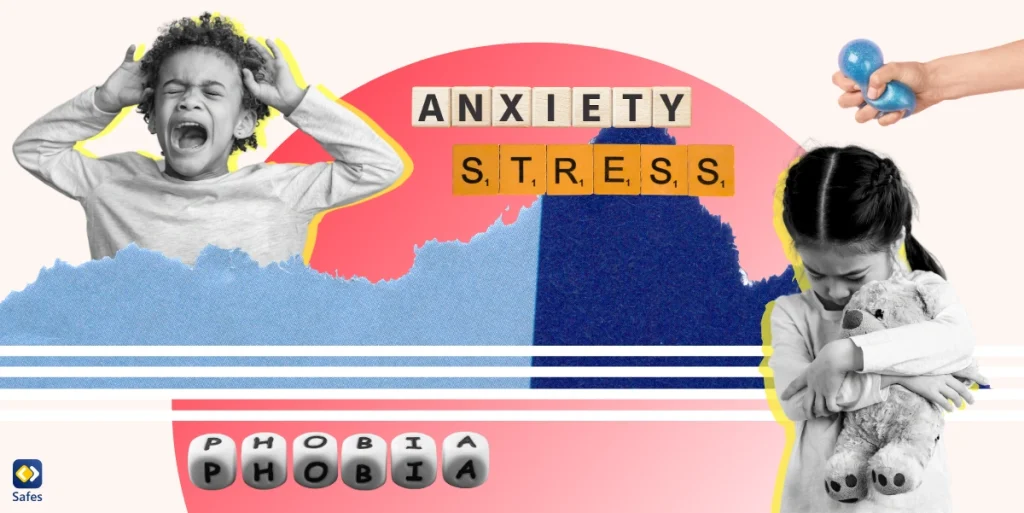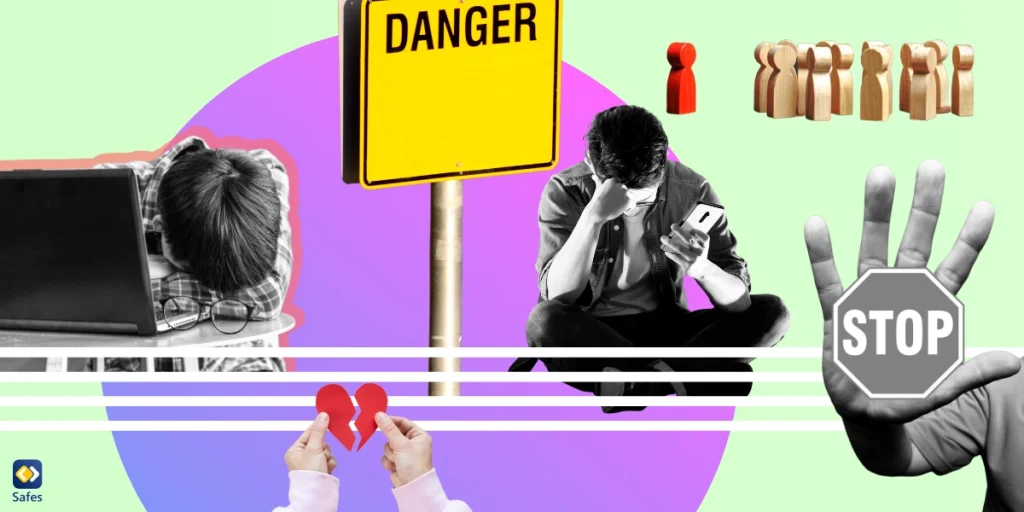Parentifying is a phenomenon that occurs when a child is forced to assume the role of a parent, taking on responsibilities and caring for their own parents or siblings. This can happen due to a variety of reasons, such as a parent’s mental illness, substance abuse, or simply the absence of a parental figure. While it may seem admirable for a child to step up and take care of their family members, parentifying can have serious long-term effects on the child’s emotional and psychological development. It is important to understand the harmful effects of parentifying in order to prevent it from happening and provide support for those who may be experiencing it. In this blog post, we will delve deeper into the concept of parentifying and explore its impact on children.
Download and Start Your Free Trial of the Safes Parental Control App
What is Parentifying?
Parentifying refers to the situation in which a child takes on the role of a parent, often due to various reasons such as the absence or incapacity of the actual parent. This can have serious long-term effects on the child’s emotional and psychological development.
There are three types of parentifying: emotional, instrumental, and reverse. Emotional parentification occurs when a child is expected to provide emotional support to the parents or siblings in the family. Instrumental parentification happens when a child is expected to take on practical or financial responsibilities such as cooking, cleaning, or paying bills. Reverse parentification occurs when a parent relies on the child for emotional or practical support.
Signs of parentification include taking on adult responsibilities such as caring for younger siblings, missing out on a normal childhood, feeling burdened or overwhelmed, and experiencing intense feelings of guilt or shame when unable to meet the expectations of the parent or family. Understanding the harmful effects of parentification is crucial in supporting those experiencing it.

The Harmful Effects of Parentifying
Parentifying can have serious long-term effects on a child’s emotional and psychological development. The emotional effects of parentification can include anxiety, depression, and low self-esteem. Children who have been parentified may also have difficulty forming relationships due to their lack of childhood experiences. The behavioral effects of parentification can include an inability to express emotions, perfectionism, and fear of abandonment. These effects can contribute to future consequences such as difficulty in adult relationships, career challenges, and mental health issues. It is essential to recognize the signs of parentification and provide support for those experiencing it to prevent these harmful effects from continuing into adulthood.
Understanding the Causes of Parentifying
Parentifying can be caused by various factors, such as absent or emotionally unavailable parents, trauma or abuse in the family, cultural or familial expectations, and other factors.
When parents are absent or emotionally unavailable, children may need to take on adult responsibilities to fill the void. Trauma or abuse in the family can also lead to parentifying, as children may feel the need to protect and care for their younger siblings or their parents. Cultural or familial expectations can also play a role, as some cultures or families may place a strong emphasis on the importance of family and caregiving roles.
Other factors such as illness or disability in the family, divorce or separation, or financial instability can also contribute to parentifying. Ultimately, the causes of parentifying are complex and can vary from family to family.
How to Prevent or Stop Parentifying
Here are some tips for preventing or stopping parentification:
Recognizing and acknowledging the issue: The first step in preventing or stopping parentification is to recognize and acknowledge the issue. This involves identifying the signs of parentification, such as taking on adult responsibilities, missing out on a normal childhood, and feeling burdened or overwhelmed.
Setting healthy boundaries: It is essential to set healthy boundaries to prevent or stop parentification. This includes establishing clear roles and responsibilities for parents and children and ensuring that children are not expected to take on adult responsibilities.
Seeking therapy or counseling: Therapy or counseling can help prevent or stop parentification. A therapist can work with the family to identify the underlying issues leading to parentification and provide guidance on addressing them.
Encouraging age-appropriate responsibilities: It is important to encourage children to take on age-appropriate responsibilities, such as chores and self-care tasks, while also ensuring that they have time to be a child and engage in age-appropriate activities. This can help prevent children from feeling burdened by adult responsibilities and missing out on a normal childhood.

By recognizing and acknowledging the issue, setting healthy boundaries, seeking therapy or counseling, and encouraging age-appropriate responsibilities, it is possible to prevent or stop parentification and minimize its impact on a child’s emotional and psychological development.
Related Articles:
- How to Break the Cycle of Toxic Parenting: A Guide for Parents
- Parenting or Overparenting? Striking the Right Balance
- When Parents Gaslight: Recognize & Combat Emotional Abuse
How Can Safes Improve Your Parenting?
The Safes parental control app can help parents improve their parenting styles by providing a flexible and reliable tool for monitoring and managing their children’s online activity. By setting time, activity, and content restrictions, parents can prevent their children from accessing potentially harmful or inappropriate content.
Additionally, by tracking their children’s devices, parents can identify potential online predators and take appropriate action to protect their children. However, it is important for parents to remember that parental controls should not be the sole method of online safety prevention, and they should involve their children in the implementation of these controls and explain why they are necessary.
Safes is accessible on both Android and iOS devices, and it offers numerous parental control features. You can follow the links provided to understand the installation process and explore the app’s features:
- Windows parental controls
- Macbook parental controls
- Parental controls on Android
- iPhone parental controls
Sign up for the Safes free trial today to experience all its comprehensive parental control features and enhance your child’s online safety.
Conclusion
Parenting is a form of emotional abuse that can have devastating effects on a child’s emotional and psychological development. It can manifest in different types and signs, including role reversal and excessive responsibility. The causes of parenting are complex and include factors such as parental mental health, addiction, and divorce. To prevent or stop parenting, parents should seek therapy or counseling and avoid relying on their children for emotional support. They can also use the Safes parental control app to monitor their children’s online activities and prevent potential online predators. However, it’s crucial for parents to involve their children in the implementation of these controls and encourage open communication. Overall, parenting is a serious issue that requires attention and intervention to ensure the healthy development of children.
Your Child’s Online Safety Starts Here
Every parent today needs a solution to manage screen time and keep their child safe online.
Without the right tools, digital risks and excessive screen time can impact children's well-being. Safes helps parents set healthy boundaries, monitor activity, and protect kids from online dangers—all with an easy-to-use app.
Take control of your child’s digital world. Learn more about Safes or download the app to start your free trial today!




